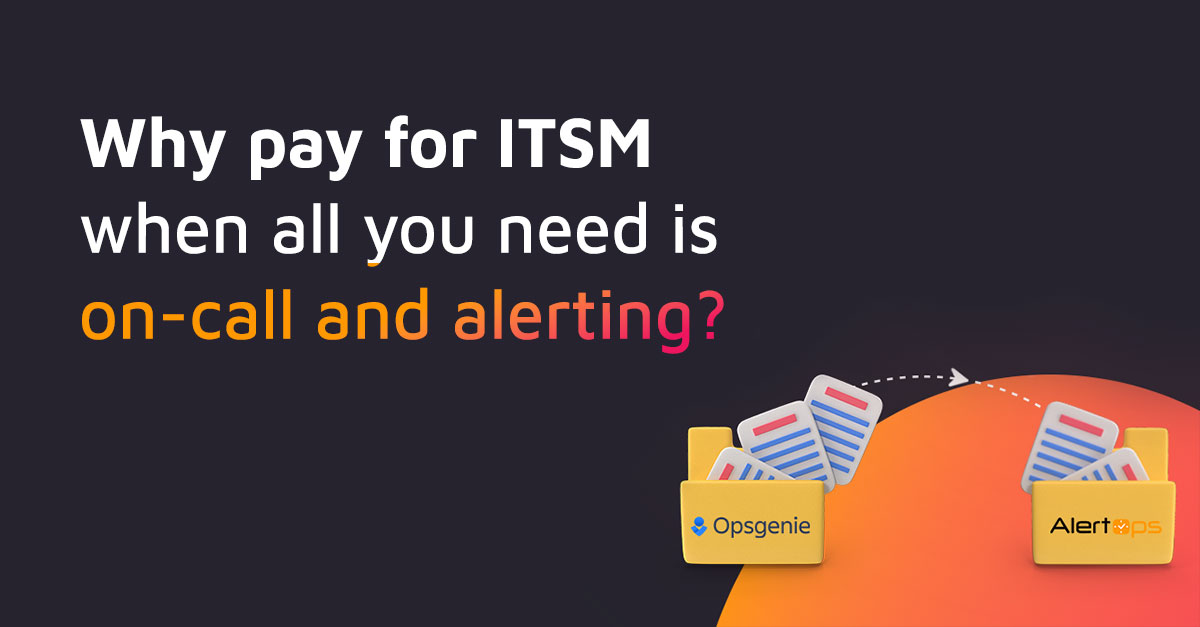In today’s fast-paced digital landscape, efficient incident management is crucial for businesses to maintain operational continuity. Amidst the various options available, AlertOps emerges as a formidable competitor to PagerDuty, offering robust solutions tailored to diverse organizational needs.
Understanding Pagerduty Competitor, AlertOps
What is AlertOps?
AlertOps is an incident management platform designed to streamline communication and resolution processes during critical events. It provides a centralized hub for managing alerts, incidents, and responses, ensuring swift resolution and minimal downtime.
How Does AlertOps Compare to PagerDuty?
While PagerDuty is renowned for its incident response capabilities, AlertOps being the best pagerduty competitor, sets itself apart through its comprehensive feature set, customization options, and cost-effectiveness.
10 Reasons: AlertOps is the Preferred PagerDuty Competitor
01. AlertOps offers advanced noise suppression without paying for add-on modules
PagerDuty recently made changes to their pricing plans by moving rules-based noise suppression features out of their Professional Plan into the Event Intelligence add-on module. AlertOps includes rules-based noise suppression features beginning in the Premium Plan. AlertOps plans offer more competitive noise suppression features vs PagerDuty plans.
02. AlertOps advanced workflows cost less than PagerDuty
PagerDuty includes Incident Workflows beginning with the Business Plan. AlertOps Workflows are included with the Enterprise Plan. With AlertOps Workflows, you can set triggers when the alert status changes, as well as when standard fields change. You can even set triggers based on custom fields, which can include Boolean fields. AlertOps Workflows can send messages to users or teams over any communication channel, including chat. Workflow messages include the ability to create dynamic messages where text from any data field can be included. When combined with Outbound Integrations, AlertOps offers virtually limitless possibilities, such as sending updates to external system such as ServiceNow or running automation actions such as restarting a service. Unlike other PagerDuty competitors, AlertOps no-code Workflows offer a simpler path to automation without paying a lot of money.
03. Scalability using a no-code platform
Because AlertOps is a purpose-built incident response platform, it has many of the essential features needed to integrate and system, manage on-call, reduce time to respond to incidents and keep stakeholders informed. All of this functionality is built-in to the AlertOps platform and can easily be extended using a no-code approach. Both PagerDuty and AlertOps offer full-featured APIs for those who want to write their own code, but for those customers that are not interested in developing, debugging and maintaining more code, AlertOps offers a tested and reliable platform that is purpose built for incident response needs. When considering a PagerDuty competitor, consider the true cost of no-code Workflows as opposed to low-code Workflows.
04. Open APIs
Integrating with other systems is essential in modern software applications. This is especially true for SaaS applications, which is why AlertOps APIs are open APIs. Both the AlertOps inbound and outbound integrations can handle any JSON payload, which means that virtually any systems can be integrated with AlertOps. When APIs require custom code, whether it is to connect to and send data to an external system, or ingest a custom payload from an external system, this can add hidden and ongoing cost the total and ongoing system costs.
05. Built-in Major Incident Management features
Major incidents may not happen every day, but when they do happen, they must be managed in a completely different manner from on-call alerting. That’s why AlertOps Major Incident Management includes things like multi-channel, simultaneous alerting to multiple teams. Automated stakeholder communications using Workflows deliver timely updates using any communications channel, including chat tools such as Microsoft Teams and Slack.
06. Automation Actions
AlertOps Enterprise includes Automation Actions that can be triggered with a click of a button in the mobile app, or the web app. Automation actions can do things such as create or close a ticket or run a remediation action.
07. Better on-call scheduling
AlertOps on-call scheduling features covers every use case, from a single person after hours, to multiple people on-call, to multiple on-call shifts. You can even include teams within teams to easily create team to team escalations on-call.
08. Better user out-of-office scheduling
With AlertOps, user on-call substitutions can be done by one user, even when that user has multiple team and shift on-call responsibilities. All the user needs to do is enter the date and times they will be out, then designate a covering person for each on-call assignment. Managers don’t need to get involved and covering users receive a notification that they are on-call.
09. Better escalations
AlertOps, like all on-call tools, includes automatic escalations from a primary on-call to a secondary on-call to a manager for on-call scenarios. AlertOps Workflows also make it easy to add additional escalations, say to a level two or level three support team.
10. Simple integration configuration
AlertOps integrations include configuration all in place. Things like alert suppression rules, escalation overrides, custom field mapping are all done within the integration. PagerDuty splits these things into different parts of the application, causing confusion and also leading to billing complexities.
Benefits of Choosing AlertOps
Cost-effectiveness
AlertOps offers competitive pricing plans, making it an attractive option for organizations of all sizes. By providing essential incident management functionalities without exorbitant costs, AlertOps ensures maximum ROI for its users.
Ease of Use
With its user-friendly interface and intuitive workflows, AlertOps simplifies incident management for teams of all skill levels. Whether responding to alerts or configuring settings, users can navigate the platform effortlessly, minimizing training overhead and accelerating adoption rates.
Scalability
AlertOps’ scalable architecture caters to the evolving needs of growing businesses. From startups to enterprises, organizations can trust AlertOps to scale alongside their operations, ensuring consistent performance and reliability.
AlertOps emerges as a compelling alternative to PagerDuty, offering a comprehensive incident management solution characterized by robust features



